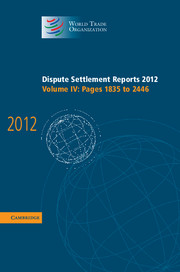Book contents
- Frontmatter
- Table of Contents
- United States - Measures Concerning the Importation, Marketing and Sale of Tuna and Tuna Products (WT/DS381)
- Table of Contents
- CASES CITED IN THIS REPORT
- ABBREVIATIONS USED IN THIS REPORT
- I INTRODUCTION
- II ARGUMENTS OF THE PARTICIPANTS AND THE THIRD PARTICIPANTS
- III ISSUES RAISED ON APPEAL
- IV BACKGROUND AND OVERVIEW OF THE MEASURE AT ISSUE
- V LEGAL CHARACTERIZATION OF THE MEASURE AT ISSUE
- VI ARTICLE 2.1 OF THE TBT AGREEMENT
- VII ARTICLE 2.2 OF THE TBT AGREEMENT
- VIII ARTICLE 2.4 OF THE TBT AGREEMENT
- IX MEXICO'S CLAIMS UNDER ARTICLES I:1 AND III:4 OF THE GATT 1994
- X FINDINGS AND CONCLUSIONS
- ANNEX I Notification of an Appeal by the United States, WT/DS381/10
- ANNEX II Notification of an Other Appeal by Mexico, WT/DS381/11
- Table of Contents
- TABLE OF WTO DISPUTES CITED IN THIS REPORT
- TABLE OF GATT DISPUTES CITED IN THIS REPORT
- LIST OF ABBREVIATIONS
- LIST OF US EXHIBITS CITED IN THIS REPORT
- LIST OF MEXICAN EXHIBITS CITED IN THIS REPORT
- LIST OF AMICUS CURIAE EXHIBITS CITED IN THIS REPORT
- I INTRODUCTION
- II FACTUAL ASPECTS
- III PARTIES' REQUESTS FOR FINDINGS AND RECOMMENDATIONS
- IV ARGUMENTS OF THE PARTIES
- V ARGUMENTS OF THE THIRD PARTIES
- VI INTERIM REVIEW
- VII FINDINGS
- VIII RULINGS AND RECOMMENDATIONS
- Cumulative List of Published Disputes
X - FINDINGS AND CONCLUSIONS
Published online by Cambridge University Press: 13 December 2017
- Frontmatter
- Table of Contents
- United States - Measures Concerning the Importation, Marketing and Sale of Tuna and Tuna Products (WT/DS381)
- Table of Contents
- CASES CITED IN THIS REPORT
- ABBREVIATIONS USED IN THIS REPORT
- I INTRODUCTION
- II ARGUMENTS OF THE PARTICIPANTS AND THE THIRD PARTICIPANTS
- III ISSUES RAISED ON APPEAL
- IV BACKGROUND AND OVERVIEW OF THE MEASURE AT ISSUE
- V LEGAL CHARACTERIZATION OF THE MEASURE AT ISSUE
- VI ARTICLE 2.1 OF THE TBT AGREEMENT
- VII ARTICLE 2.2 OF THE TBT AGREEMENT
- VIII ARTICLE 2.4 OF THE TBT AGREEMENT
- IX MEXICO'S CLAIMS UNDER ARTICLES I:1 AND III:4 OF THE GATT 1994
- X FINDINGS AND CONCLUSIONS
- ANNEX I Notification of an Appeal by the United States, WT/DS381/10
- ANNEX II Notification of an Other Appeal by Mexico, WT/DS381/11
- Table of Contents
- TABLE OF WTO DISPUTES CITED IN THIS REPORT
- TABLE OF GATT DISPUTES CITED IN THIS REPORT
- LIST OF ABBREVIATIONS
- LIST OF US EXHIBITS CITED IN THIS REPORT
- LIST OF MEXICAN EXHIBITS CITED IN THIS REPORT
- LIST OF AMICUS CURIAE EXHIBITS CITED IN THIS REPORT
- I INTRODUCTION
- II FACTUAL ASPECTS
- III PARTIES' REQUESTS FOR FINDINGS AND RECOMMENDATIONS
- IV ARGUMENTS OF THE PARTIES
- V ARGUMENTS OF THE THIRD PARTIES
- VI INTERIM REVIEW
- VII FINDINGS
- VIII RULINGS AND RECOMMENDATIONS
- Cumulative List of Published Disputes
Summary
407. For the reasons set out in this Report, the Appellate Body:
(a) finds that the Panel did not err in characterizing the measure at issue as a “technical regulation” within the meaning of Annex 1.1 to the TBT Agreement;
(b) finds that the Panel erred in its interpretation and application of the phrase “treatment no less favourable” in Article 2.1 of the TBT Agreement; reverses the Panel's finding, in paragraphs 7.374 and 8.1(a) of the Panel Report, that the US “dolphin-safe” labelling provisions are not inconsistent with Article 2.1 of the TBT Agreement; and finds instead that the US “dolphin-safe” labelling provisions are inconsistent with Article 2.1 of the TBT Agreement;
(c) finds that the Panel erred in concluding, in paragraphs 7.620 and 8.1(b) of the Panel Report, that it has been demonstrated that the measure at issue is more trade restrictive than necessary to fulfil the United States' legitimate objectives, taking account of the risks non-fulfilment would create; and therefore reverses the Panel's finding that the measure at issue is inconsistent with Article 2.2 of the TBT Agreement;
(d) rejects Mexico's claim that the Panel erred in finding that the United States' objective of “contributing to the protection of dolphins, by ensuring that the US market is not used to encourage fishing fleets to catch tuna in a manner that adversely affects dolphins” is a legitimate objective within the meaning of Article 2.2 of the TBT Agreement;
[…]
- Type
- Chapter
- Information
- Dispute Settlement Reports 2012 , pp. 2001 - 2002Publisher: Cambridge University PressPrint publication year: 2014



